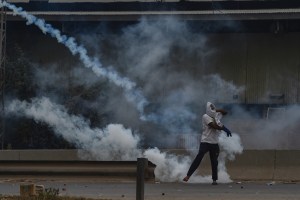A Sri Lankan man accused of blasphemy was lynched and his body set ablaze by workers he oversaw at a factory in the city of Sialkot in northeastern Pakistan.
Priyantha Diyawadanage, 48, the general manager at Rajco Industrustries, was targeted by the violent mob following rumors that he was tearing stickers bearing the name of the Prophet Muhammad.
Videos by VICE
On Friday, Dec 3, a few dozen workers began protesting outside the factory gates against Diyawadanage, accusing him of blasphemy. The crowd swelled to the hundreds as local residents began to join in, causing a traffic jam in the vicinity.
Fearing the mob, Diyawadanage rushed to the factory roof but was charged upon by throngs of people chanting anti-blasphemy slogans used by the fundamentalist political party Tehreek-e-Labbaik Pakistan (TLP). In a video, Diyawadanage could be seen clinging desperately to his colleague Malik Adnan, who was trying to shield him from the oncoming crowd.
Chilling videos circulating across social media show the crowd hurling Diyawadanage onto the ground, tearing off his clothes and ruthlessly beating him. The mob proceeded to torture Diyawadanage using stones and iron rods until he became motionless. The mob then set Diyawadanage on fire. In some videos, a few people are seen taking selfies with the corpse.
“Due to the renovation of the factory building, some posters were taken off from the wall. They may have desecrated posters bearing the name of Prophet Muhammad. Maybe the manager was lynched because of that,” police assistant comissioner Murtaza Muhammad told the press.
“Unfortunately, I can’t affirm or deny anything at the moment. The alibi used for murder is blasphemy but the cause of murder appears personal and targeted. The issue is being investigated,” he said. The province’s police chief also said that police were notified of the incident at 11:28 a.m. and reached the spot at 11:45 a.m.

A police report has been registered against 900 people for the murder, which include charges of terrorism. Around 126 have been arrested so far. Police have revealed that 57 suspects have been identified through CCTV footage out of which 25 have been detained. Raids are underway to track down the remaining suspects. Police are also currently analysing data from 160 CCTV cameras along with cell phone videos, mobile data and phone logs.
Diyawadanage’s wife Nilushi Dissanayaka has denied the allegations of blasphemy against her husband. “I totally reject reports that said my husband tore down posters in the factory. He was an innocent man,” she told the BBC.
Diyawadanage was reportedly a Christian. VICE World News could not immediately verify this.
“He was very much aware of the living conditions in Pakistan. It is a Muslim country. He knew what he should not do there and that’s how he managed to work there for eleven years,” Dissanayaka said.
According to Adnan, who is set to receive the national Tamgha-i-Shujaat award for attempting to save Diyawadanage’s life, the stickers were being temporarily removed for a clean-up, which was part of factory protocol.
In response to the incident, Prime Minister Imran Khan tweeted: “The horrific vigilante attack on a factory in Sialkot and the burning alive of a Sri Lankan manager is a day of shame for Pakistan. I am overseeing the investigations. Let there be no mistake: All those responsible will be punished with the full severity of the law.”
In a tweet, Sri Lankan Prime Minister Mahinda Rajapak said: “Sri Lanka and her people are confident that Prime Minister Imran Khan will keep to his commitment to bring all those involved to justice.”
Khan’s special representative on religious harmony, Tahir Ashrafi, has said that police are investigating the case from various angles, including that some factory workers might have “played a religious card to take revenge on the manager.”
Blasphemy is a highly contentious issue in Pakistan, and people accused under its blasphemy laws can be sentenced to death. Critics say false reports of blasphemy are rampant, and the law is often abused to settle personal issues with people from minority groups. Since 1990, around 77 people have been killed in vigilante mob attacks that stemmed from blasphemy allegations. While human rights activists have been calling for an end to the colonial-era blasphemy law, the TLP has succeeded in having the government keep it in place, through several violent protests since 2017.
“Few other religious groups got the same type of media visibility that TLP got in its early days. If any other group behaved like TLP did they would be dealt harshly by the state, as has been the case with nationalist groups,” Freelance journalist and web developer Fahad Desmukh told VICE World News. “But instead the government repeatedly negotiated and made compromises with the TLP, and despite later being banned were able to continue operating freely – even contesting elections and receiving well wishers from the government.”

The TLP has denied any connection to the incident. “While the incident is tragic, what’s equally sad is linking the TLP to it. We call for an independent and transparent investigation and those responsible to be arrested and exposed. When the rule of law prevails, no one will dare take the law into their hands,” a TLP spokesman told local press.
However, the mob was caught on camera using a blasphemy slogan that most Muslim scholars distance themselves from, but which the TLP uses and has popularized through viral internet videos.
“There is an ecosystem through which these messages circulate – from speeches at rallies, to mainstream media, to bit-sized social media content savvily edited together with catchy music and slick graphics, to homes and schools, to sites of violence,” said Desmukh.
The episode has been widely condemned in Pakistan, with protests condemning the attack. Prominent religious scholars have denounced the lynching.
Diyawadanage’s body is expected to be returned to Sri Lanka on Dec 6.
Follow Rimal Farrukh on Twitter.






